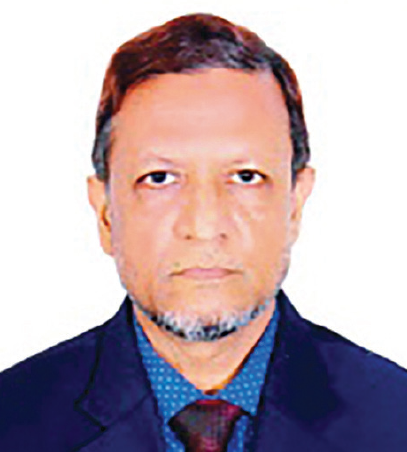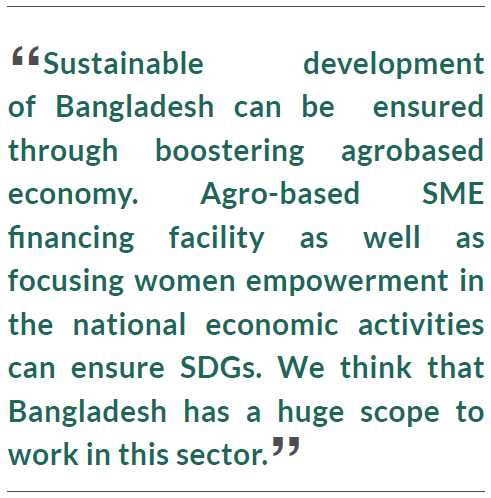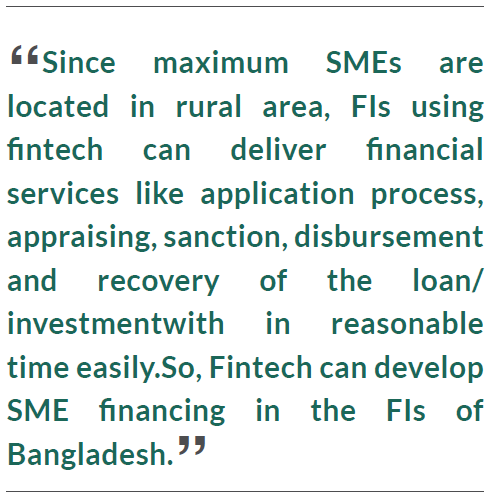A.K.M. Shahidul Hoque Khandaker, Senior Vice President & Head of SME
Leading the Largest SME Portfolio in Bangladesh
Islami Bank has the largest SME portfolio of Bangladesh. SME portfolio consists of 11% of total SME portfolio of Bangladesh. Currently A.K.M. Shahidul Hoque Khandaker is leading the large portfolio as the capacity of Head of SME.

A.K.M. Shahidul Hoque Khandaker
Senior Vice President & Head of SME, Islami Bank Bangladesh Limited
MBR: SME is called to be the growth engine for a vibrant economy like Bangladesh. Being the leader of SME division of the largest SME bank in Bangladesh, how do you see the growth avenues for SME sector?
A.K.M. Shahidul Hoque Khandaker:
SME is important for a country like Bangladesh in employment generation, povertyreduction, women empowerment and inclusive economic growth. More than 90-95 percent of industrial units in Bangladesh belongs to SME. SME sector in Bangladesh contributes 25% in GDP, 40% in employment, 80% in industrial jobs and substantially contributes in export.
SME plays a pivotal role in development of a country. SME sector is commonly considered as an important vehicle for attaining inclusive growth of any developing country. Industrial revolution started through developing Small and Medium Enterprises, which reduces unemployment and alleviates poverty.
Development of a country depends on proper utilization of local resources, which can be easier through SME. Japan, Germany, Britain, France, the leader of industrialization developed themselves through encouraging SME.
As a least developed country, Bangladesh has a huge scope to contribute in national economy through industrialization. A substantial number of youth are unemployed. If we like to bring these unemployed youth to the mainstream economy, alleviate poverty and graduate our country as a developed one, we have to focus on SME specially developing village economy through injecting capital, provide training for capacity building and accumulating mass people in the economy.

MBR: What is the SME Business model of Islami Bank Bangladesh Limited ?
A.K.M. Shahidul Hoque Khandaker:
Islami Bank Bangladesh Limited (IBBL) uses branch banking model for SME business where each and every branch act as front office. Induction of new entrepreneurs, proposal processing, disbursement, supervision, monitoring and recovery are done by the branches. Approval of investment done by branch, Zone and Head Office as per discretionery power delegated by the Board of Directors of the Bank. To manage overall SME business portfolio of the bank, we have established 2(Two) investment divisions namely SME Investment Division-I & SME Investment Division-II under Retail Investment Wing with the leadership of a senior executive Deputy Managing Director/Senior Executive Vice President. As per Bangladesh Bank guideliness we have also a Women Entrepreneur Development Unit at Head Office and SME & Women Entrepreneur dedicated desk at Zone and Branch offices to operate the SME business. Besides these, 2(two) separate divisions are also working on SME business namely Rural Development Division and Retail, Consumer & Real Estate Investment Division under the same wing. We provide investment/facility to the SMEs as per usual banking norms i.e.continuous and term investment/facility on the basis of nature of business or requirement. There is no involvement of 3rd party vendor in this model, which is handled by bank officials directly. So, the total investment process is based on banker-customer relationship. This is why, it is cost effective, almost free from bad client induction and over financing. Since the invesment in this model is on revolving basis, the rate of NPI is comparatively low.
MBR: How financial institution can come up with the new product/initiatives for SMEs to empower the market?
A.K.M. Shahidul Hoque Khandaker:
There is a lot of scope in Bangladesh to work in SME sector. Huge number of population are out of direct financial services. Bank and Financial Institutions can come up wth new products initiatives on sector or sub-sector wise like trading, manufacturing, service, agriculture, light engineering, cluster as well as women entrepreneurs considering the type of demand and necessity of the business.
MBR: How women entrepreneurship loan will help develop SME financing?
A.K.M. Shahidul Hoque Khandaker:
50% of the total population of our country are women. It is impoossible to develop the country without participation of the women in overall economic activities.
Therefore, it is necessary to develop entrepreneurship among the women to involve them in the mainstream economy towards national development. They need required financing to run their business. Women Entrepreneurs are the part of SMEs. So, financing to the women entrepreneurs will help SME financing and develop their overall business activities as well as increase contribution in national development.

MBR: How Fintech can develop SME financing in the FIs of Bangladesh ?
A.K.M. Shahidul Hoque Khandaker:
Fintech means financial technology, the new technology and innovation like application, processess, product, business model is used for delivery of financial services, which improve financial activities. The use of smart phones for mobile banking, investment services and cryptocurrency are examples of fintech to make financial services more accessible to the customers. By using fintech financial institutions can improve and develop their services and render all kinds of financial services to the SME clients easily within the shortest time at lower cost.
MBR: What are the challenges for SME business and SME financing in Bangladesh?
A.K.M. Shahidul Hoque Khandaker:
Now a days SME business and financing is the most important matter in Bangladesh. Development partners, Government, Central Bank, SME Foundation and Financial Institutions are trying to explore develop/strengthen the SME business by all means. Yet, SME busniess and financing are facing some challanges. These are-Non-co-operation by different authorities for getting necessary permission/papers/documents/utilities etc and facing obstacles from local miscreants incurring huge unseen/hidden costs; Unwillingness of the Banks/FIs due to lack of collateral security; Limited access to finance, Lengthy process; lack of adequate knowledge, skill and experience; Lack of expertise & technological support; Higher interest/profit rate; Necessity of excessive documents; Obligation for credit rating; Lack of suitable incentives,; Limited access to business information & market opportunities; Lack of business plan, managerial capacity and marketing skill; Weak infrastructure; Compliance issue; Hard competition in local and international market etc.
If, we overcome these challanges and can attract the entrepreneurs towards financing facilities as well as provide them necessary advisory and technological support, we are hopeful that SME will be the pioneer in national development and can play a vital role in achieving government target of middle income country by 2021 and developed economy by 2041.
MBR: What initiatives of the regulator will be helpful for SME financing?
A.K.M. Shahidul Hoque Khandaker:
Bangladesh Government has declared SME as the priority sector in the Industrial Policy 2016 and established SME Foundation under Ministry of Industry to support SME sector. Bangladesh Bank has established a separate department namely SME &Special Programs Department to develop SME sector. Bangladesh Bank has been trying to expedite financing to the SMEs through scheduled Banks and NBFIs continuously. They have formulated and circulated different guidelines to the Banks/FIs to ease the access to finance to the SMEs.
Bangladesh bank has also created re-financing fund to help SME financing through Banks/FIs with the help of Donor Agencies.
Yet, there are scopes to take some initiatives from the regulators, which will be helpful for SME financing e.g.
![]() To ensure co-ordination among the regulators and all other stakeholders
To ensure co-ordination among the regulators and all other stakeholders![]() To ensure getting necessary permission, papers, documents, utilities, infrastructure facilities etc. easily at a nominal cost
To ensure getting necessary permission, papers, documents, utilities, infrastructure facilities etc. easily at a nominal cost![]() To ease regulatory compliance
To ease regulatory compliance![]() To build-up credit guarantee fund with SMEF to ensure finance to the prospective entreprenuers who have no security with the help of donor agencies and
To build-up credit guarantee fund with SMEF to ensure finance to the prospective entreprenuers who have no security with the help of donor agencies and
CSR fund of Banks & Financial Institutions![]() To motivate the policy makers & management of the Banks/FIs to give preference on SME financing at a affordable rate of return
To motivate the policy makers & management of the Banks/FIs to give preference on SME financing at a affordable rate of return![]() To give R&D, training, technical & technological marketing etc support/facilities to the entrepreneurs continuously.
To give R&D, training, technical & technological marketing etc support/facilities to the entrepreneurs continuously.![]() To take proper initiatives to bring the informal light engineering sector to formal sector as backward linkage
To take proper initiatives to bring the informal light engineering sector to formal sector as backward linkage![]() To take initiatives to bring insurance companies in supervision process of SMEs to keep them in right track.
To take initiatives to bring insurance companies in supervision process of SMEs to keep them in right track.
Monthly Business Review- April 2019
Banks/FIs deserve accolades for expanding their SME portfolio over the past years and thus exceeding the SME disbursement target given by the Central Bank. However, the financial industry is still saddled with some concerns when SME lending is in question. Banks find it hard to consider SME loans as a core focus segment because of the higher cost of monitoring and underwriting, as SMEs are scattered all across the country and are unstructured in terms of account management. Therefore, underwriting of SMEs is expensive and time-consuming since the cost and underwriting process for all borrowers (irrespective of size and value) are similar. FIs can come up with scoring models for SME businesses by deploying technology leveraging on the huge set of customer data. Also, more than just funding, small businesses require business management tools and advice on how to
diligently manage working capital and FIs are the best fit to help them out in this scenario.
Lastly, this is worthy to mention that the whole financial industry played a crucial role in building SME ecosystem and educating the market at this level, with prudent guidance from the Central Bank. Now, expanding the SME market reach in a low cost manner, by deploying technology should be the priority of Banks or FIs.
Download View